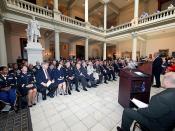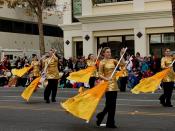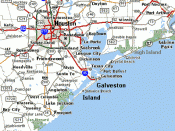Shlong Flonnie Ding-a Ling Dick Dowling at Sabine Pass is the story of Dick Dowling and a group of Irish immigrants that fought in the Civil War. It was written by Frank Tolbert. The story is set in Southeast in the late 1800's.
Dick Dowling was born in Ireland in 1838. He was a muscular redhead with a courageous spirit. The Dowling family left Ireland in 1846, the year of a great potato famine. They escaped starvation to live in New Orleans where his father became a proprietor of several businesses. Around 1848, Dick's parents died, so he and his three sisters moved to Houston, Texas. By the 1850's Dowling owned several saloons in Houston. He became popular and married Anne Odlum in 1857. His wife's uncle, Frederick Odlum, influenced him to get involved in the military. He became a member of a newly formed company the Davis Guards.
Frederick Odlum was the commander and he appointed Dowling as first lieutenant. The Davis Guards were made up of forty-two Irish born Texans.
In February 1861, the Davis Guards enlisted in the Confederate Army. Unfortunately, the company found no respect for their whole first year. They were constantly reassigned along the Texas coast because no one wanted to fight with the "petty"ÃÂ Irish immigrants.
They finally saw their first real combat while stationed in Galveston on New Year's Day, 1863. The Davis Guards were under command of John Magruder. The commanding General of the Texas Department became very fond of the brave and skillful Irishmen. The Federals had blockaded the Texas coast and captured Galveston Island. The Federals planned to use Galveston as a staring point for a mainland invasion. Magruder put an end to this plan with help of his army and naval forces. The Confederates were victorious in pushing the Federals back in to the Gulf of Mexico. Confederate casualties were few, except for a Davis Guard. Although the Federals lost, the fighting didn't end on land. Confederate ships started making hit and run attacks on the Federal blockade ships. In particular, the Confederate ship Alabama, a very heavily armed gunboat, made a few very devastating blows to the Federal ships near Texas. The ship was so powerful it would take three average blockade ships to match its firepower. The Alabama became known as the "ghost ship"ÃÂ, and it was enough to make the Federal ships paranoid for years after its departure from Texas waters.
The Davis Guards got to fight some more with Magruder the next year. This time they were aboard the Confederate ship Bell. The Bell and on other Confederate ship, Uncle Ben, blew a federal blockade ship out of the water. They engaged and captured it near the Sabine Pass. The Davis Guards were doing exceptionally well, but for some reason, probably discrimination, they received no recommendations for promotion. They Davis Guards were reassigned to an isolated garrison duty where some pick-and-shovel work would be required.
They were assigned to build and guard a fort along the Sabine Pass. Before they could finish building the fort, a surprise attack was supposed to overwhelm them. The Federals saw the Sabine Pass as a great target to commence their mainland invasion. The Federals were to be commanded by Frederick Crocker. The attack was suppose to be on the night of September 6, 1863, but do to some stupid errors they were delayed till the eighth. By the time the federal fleet of four gunboats and six thousand troops entered the pass it was no longer a surprise attack. The forty-one Davis Guards were ready as ever to defend their small unfinished fort. The Federals planned to navigate upstream past the fort and surround it, but disaster struck when two of their ships became stuck in the narrow pass's mud. The Davis Guards picked them off like sitting ducks, and the remaining fleet became scared and fled back to New Orleans. The Davis Guards were victorious. The courage and bravery of the Irishmen served to better the treatment of Irish immigrants as a whole.
The Davis Guards didn't see anymore fighting for the rest of the war. Once the war was over, Dowling returned to his wife in Houston and became a great war hero. He started a family and lived the rest of his life as a hardworking businessman. Unfortunately, his hard work caught up with him when he died form working too hard while he was sick. Dick Dowling died on September 23, 1867. The city of Houston erected a statue to honor his great war triumphs, and it's still standing today.

![West Virginia Guard soldiers help prevent volunteer fire dept. roof collapse [Image 1 of 9]](https://s.writework.com/uploads/9/90050/west-virginia-guard-soldiers-help-prevent-volunteer-fire-dep-thumb.jpg)



